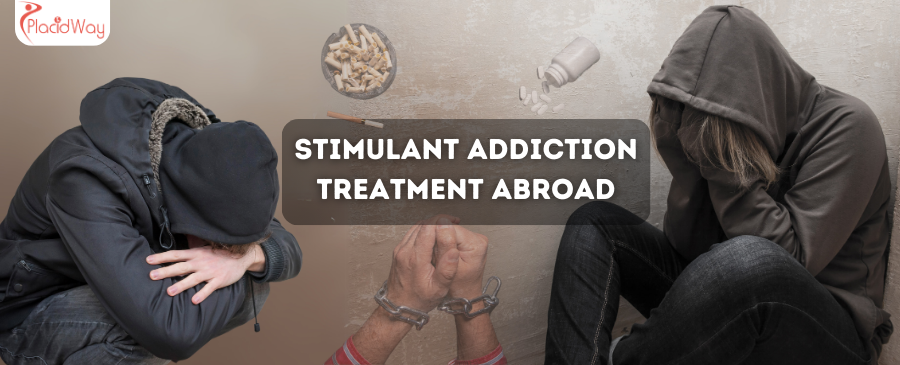Stimulant Addiction Treatment
Addiction Treatment
Modified Date: 2024-11-13

Key Insights at a Glance
- Stimulant addiction involves the misuse of drugs like cocaine, methamphetamine, and prescription stimulants.
- Common symptoms include increased energy, euphoria, and decreased appetite, followed by fatigue and depression when the drug wears off.
- Effective treatment typically requires a combination of therapy, support groups, and sometimes medication.
- Understanding the underlying causes of addiction is crucial for successful recovery.
- The cost of treatment can vary widely depending on the method and location.
Stimulant addiction is a condition characterized by the compulsive use of stimulant drugs, which enhance brain activity and elevate mood. These substances can include illegal drugs like cocaine and methamphetamine, as well as prescription medications used for attention deficit hyperactivity disorder (ADHD) and narcolepsy. Stimulant addiction can lead to serious health complications, including cardiovascular problems, mental health disorders, and social issues.
Common symptoms of stimulant addiction may include:
- Increased energy and alertness.
- Euphoria or heightened mood.
- Decreased appetite and weight loss.
- Increased heart rate and blood pressure.
- Paranoia, anxiety, or agitation.
- Fatigue or depression during withdrawal.
Factors that may increase the risk of developing a stimulant addiction include:
- Genetic predisposition to addiction or substance abuse.
- History of mental health disorders, such as depression or anxiety.
- Environmental influences, including peer pressure or exposure to drug use.
- Chronic stress or trauma, leading to self-medication with stimulants.
Diagnosis typically involves:
- A comprehensive evaluation by a healthcare professional, including a review of medical history and substance use.
- Assessment of symptoms and their impact on daily functioning.
- Screening tools or questionnaires to evaluate the severity of addiction.
Effective treatment for stimulant addiction may include:
- Behavioral Therapy: Cognitive-behavioral therapy (CBT) and contingency management can help modify harmful behaviors and promote positive change.
- Support Groups: Participation in support groups like Narcotics Anonymous (NA) can provide community and encouragement during recovery.
- Medication: While there are no FDA-approved medications specifically for stimulant addiction, certain medications may help manage withdrawal symptoms and cravings.
- Inpatient or Outpatient Programs: Depending on the severity of addiction, treatment can be conducted in an inpatient setting or through outpatient services.
Potential risks associated with stimulant addiction and its treatment include:
- Risk of overdose, particularly with high doses or mixing stimulants with other substances.
- Withdrawal symptoms, which can include depression, fatigue, and increased cravings.
- Potential for co-occurring mental health disorders that require integrated treatment.
- Social and legal consequences stemming from substance abuse.
The cost of stimulant addiction treatment can vary significantly based on factors such as location, treatment type, and duration. Below is a general overview:
| Country |
Average Cost (USD) |
| USA |
$5,000 - $20,000 |
| Mexico |
$2,000 - $8,000 |
| Turkey |
$1,500 - $6,000 |
| Thailand |
$1,200 - $5,000 |
| Colombia |
$1,000 - $3,500 |
| India |
$800 - $2,500 |
For detailed pricing, please Find Prices for Stimulant Addiction Treatment Near You.
What are the common treatments for stimulant addiction?
Common treatments include behavioral therapy, support groups, and inpatient or outpatient programs.
How long does recovery take?
Recovery duration varies by individual and can take weeks to months, depending on the severity of the addiction and the treatment approach.
Are there medications for stimulant addiction?
While there are no specific medications approved for stimulant addiction, some medications can help manage withdrawal symptoms and cravings.
Can stimulant addiction lead to other health issues?
Yes, stimulant addiction can lead to cardiovascular problems, mental health disorders, and other serious health complications.
How to Choose the Right Clinic for Stimulant Addiction Treatment
- Look for accredited clinics with a strong reputation in addiction treatment.
- Review the clinic's success rates and patient testimonials.
- Ensure the clinic offers comprehensive treatment options tailored to individual needs.
- Inquire about the clinic’s experience with stimulant addiction specifically.
If you are considering treatment for stimulant addiction, it is essential to consult with skilled professionals who can guide you through the process. PlacidWay can connect you with top-rated clinics specializing in addiction treatment, ensuring you receive the highest standard of care. Take the first step towards recovery and a healthier future today!
